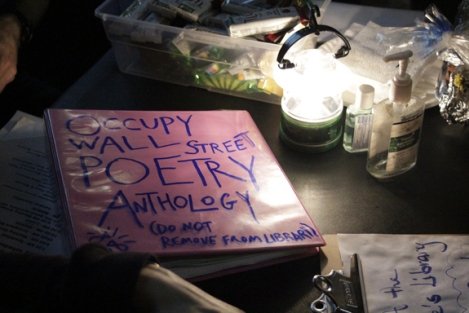I’ve started a campaign for printing the OWS Poetry Anthology, the goal is to raise $40,000. You can check out the fundraiser on indiegogo here.
The OWS Poetry Anthology was born the second week of the Occupy Wall Street Poetry Assembly. I was so overwhelmed by the diversity and greatness of the poems presented during the first week of the Assembly, that I knew the assembly must be archived. So at the second Poetry Assembly I asked the poets gathered if I could archive it, then I gave out my email, expecting only a few poems to show up in my inbox. The response was overwhelming, and in the weeks that followed, I received a steady stream of poems from people all over the world. It seemed everyone that had been struck by the Occupy Movement had something to say, and an open Poetry Anthology, that was open to all voices and all types of “poetry” seemed like the appropriate way of archiving the inclusive spirit of Occupy Wall Street.
Many names have contributed to the anthology, some of which you may know: the visual artist Molly Crabapple did the cover art and some of the more prominent poets that contributed are Adrienne Rich, Eileen Myles, Ngoma Hill, the Allen Ginsberg Society on behalf of Allen, Wanda Coleman, CA Conrad, Dodie Bellamy, Kevin Killian, Charles Bernstein, Eliot Katz, Michael McClure, Lawrence Ferlinghetti, Lee Ann Brown, Anne Waldman, Puma Pearl, Danny Schechter, Stuart Leonard, Filip Marinovich, Ariana Reines, Frank Sherlock, and many many more…
The money donated to this project will allow for the OWS Poetry Anthology to be printed and given away to a lot of people. The more money the project receives, the more copies we will be able to print. The anthology has been open to anyone to send in poems of any size and definition since early October 2011. It’s over a thousand Microsoft Word pages. It’s probably the lengthiest, most inclusive text the Occupy Wall Street movement has yet produced and its a direct reflection of the SOUL of the movement. On April 14th, the Jefferson Market Library in Manhattan will be hosting the OWS Poetry Anthology community for an afternoon of open readings, where anyone can come and join and read a poem. To mark the occasion, we will be presenting the library with the first book print copy of the anthology for them to have on record. Also the money will go towards shipping and storage fees.
The Anthology is over a thousand pages, it’s a very big book. Originally I was going to ask for $50,000.00 as it’s going to be expensive to print this book and ship it. But in the interest of just getting copies into the world, I figured it was safer to shoot for $30,000.00. However, if the goal is met, and more money comes in, that will mean more copies can be printed. The more copies printed, the more people will be able to own it and the more special collections we will be able to get it into. By the time this project is completed, the NY Public Library and Poet’s House in NYC will already have copies in their collections. I’d like to get this important record into as many public collections as possible.
For the past few months I’ve been trying to persuade publishers to print the book in its entirety but it seems the values of this book do not mesh with the values of a publishing company, as we would like for this book to be given out to people freely and we would prefer not exclude any poets nor poems from its pages. So it seems the only way to keep the book, in all its magick, is to print it ourselves and to bring it to the people ourselves, and to read from its pages ourselves. This book is a radical departure from the traditional structure of the “anthology”, most anthologies are very selective, while this collection seeks to welcome all forms of poetry and engages in experiments like placing a famous poets poet next to a never before heard poet. What happens when you don’t exclude an idea and you let everyone encounter the idea? What happens when you print thousands of copies of a book of poetry and GIVE IT AWAY FREE?!
The poems that have comprised this anthology are poems from the soul, poems demanding a new world, poems begging that the recession end, poems from hysterical and starving peers, even poems from the 1% ready to argue against Occupy Wall Street, there are poems from the world over that is standing up virtually naked at the feet of a corporate beast, a war of David versus Goliath scope, and the people that have assembled and added to the OWS Anthology are ready to speak out against the atrocities destroying our Earth, fight back and create a future that can beget a future.
I read from and spoke about the Anthology on WBAI a little while back, you can listen to that program here. The Anthology has received a lot of press, from independent press to the Nation to the Wall Street Journal. So if you’re interested and unfamiliar with this project, search around the internet and you will find a lot of information about what we’ve been doing! Thank you!












